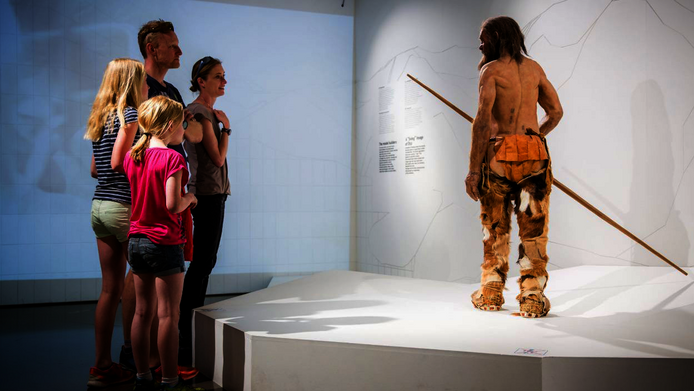History skills need more fostering

Hearing terms such as “Ötzi” or “the Iceman” conjures up a mental image for many Austrian school children. In many cases, that image came from a history textbook. But is there proof for the history presented in textbooks? How and on what basis has it been drawn up? “One could suggest, for instance, that the way Ötzi is portrayed might be challenged. Some of it can be proved, but a specific facial expression is something the illustration artist has come up with,” explains Christoph Kühberger, a historian and expert in history and civic education at the University of Salzburg. The awareness that a given text about history reflects only one possible perspective and is generally a construct is something children can be taught. The sooner this learning process is initiated, the better. Today, many school children are confronted with historical content on a daily basis, be it via the Internet, on television or in computer games. “They have no choice but more or less to believe what is presented to them, which puts them at the mercy of this type of history culture. In history lessons in the classroom, on the other hand, they could be taught to think independently and challenge things in a critical manner, thereby developing discretionary skills,” says the historian.
Hardly ever seen in the classroom
Modern-day history didactics promotes the concept of a “focus on subject-specific skills”. Since 2008, this concept has been anchored in the curriculum for history at secondary level I (age 10-14). Together with Roland Bernhard and Christoph Bramann, Kühberger explored how this concept is implemented in history lessons and whether history textbooks support this approach in a project funded by the Austrian Science Fund FWF. The twin focus was on history textbooks published between 2008 and 2016 and on how they are used in the classroom. For the first time, the perspectives of 277 teachers and 1,086 pupils from 25 schools in Vienna, Graz and Salzburg were integrated in the study. The fact that the researchers made an empirical strategy applicable to history didactics was greeted with wide interest, since there is a lot of catching up to do in terms of research and data collection in this still young academic subject. “There has been little change in the history textbooks when it comes to a focus on skills. While one finds it here and there, it is not always taken seriously,” notes Kühberger. For example, more than three quarters of the work tasks are aimed at reproduction of contents without any focus on historical thinking, i.e. a critical questioning of content.
Outdated attitude slows down development
According to the project results, the attitude of teachers, i.e. whether they focus on content or are open to catering to subject-specific skills, depends on their age and, thus, on their own training. For young teachers, the didactics of history is now part of the curriculum, and many of them have a correspondingly positive view of the skills focus. Older teachers, on the other hand, have a more traditional attitude, especially male history teachers at grammar schools. For the latter group, the highest priority is on acquiring knowledge and memorising facts. Many of them believe that factual knowledge must come first and that the critical challenging of facts can come only later - i.e. in the upper cycle of secondary school (age 14-18). “This is highly problematic. Many youngsters don't go on to the upper cycle and are therefore never encouraged to think critically about history,” Kühberger explains. Another problem relates to a standpoint widely found in society - albeit outdated – that school children should learn a certain canon in history lessons. “In the 21st century, it has become very difficult to capture knowledge in a globalised society,” emphasises Kühberger. In addition, the pupils already come with certain views about history. They cover a whole range from “what is written in textbooks is true” to more reflected points of view. Socio-economic factors, such as the number of books you own, are key influences on someone’s take on history. The resulting level of heterogeneity in a classroom can be pronounced, and there are also differences between different types of secondary school.
Making better use of opportunities
As far as teaching is concerned, history textbooks potentially offer a great deal of benefits. The study has shown that all teachers interviewed use the history textbook “(very) frequently”, which makes history a textbook subject. Half of the teachers say that they teach in a skills-oriented way. “However, there is still a lot of room for transforming textbooks so that they support teachers in their efforts to encourage critical historical thinking. In addition, it would be important to include the beneficial use of textbooks in teacher training to a greater extent,” recommends Kühberger. Despite the multitude of information sources, history lessons in the classroom are still a central knowledge resource for children under the age of 14. It is only there that adolescents also have the opportunity to acquire history skills at an early age and to question representations of history. The benefits of such an approach will be with them throughout their lives, whenever they are confronted with “stories” about the past in museums, in everyday life, in politics or on the Internet.
Personal details Christoph Kühberger is a historian and Professor of history and civic education at the Department of History, University of Salzburg. The researcher himself taught at secondary school for many years and, among other things, headed the Federal Centre for Social Learning at the Pedagogical University of Salzburg. His research focuses on empirical didactics of history, pragmatics of historical-political education or ethics of historical science.
Publications





